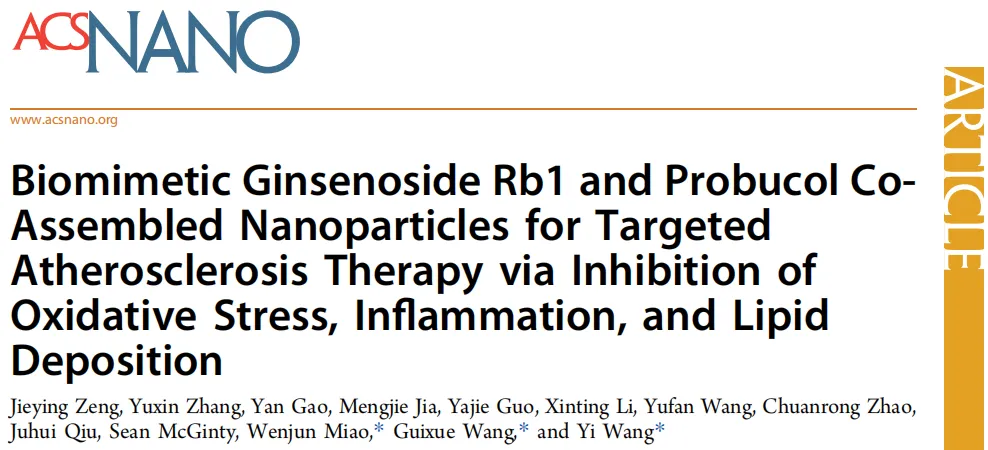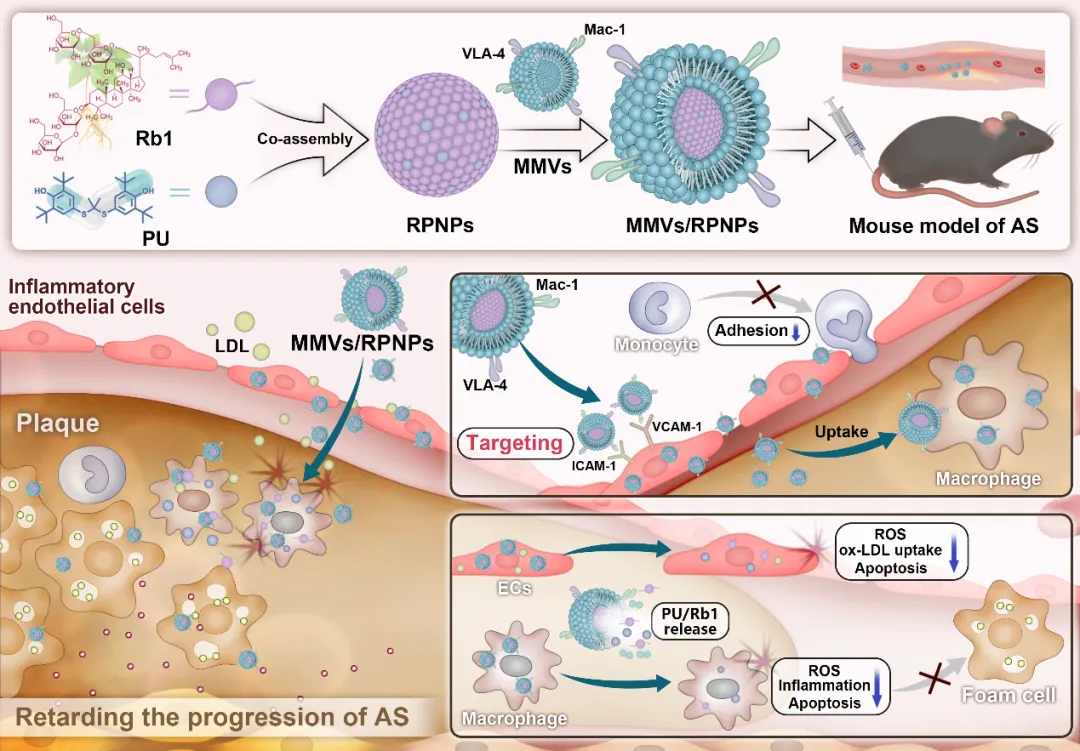
Recently, Professor Wang Guixue's team in Jinfeng Laboratory cooperated with Associate Professor Wang Yi of Chongqing Medical University to work in the international journal ACS Nano (Top Journal of the First Major Area of the Chinese Academy of Sciences, Nature Index Journal, Impact Factor: 16) published a entitled "Biomimetic Ginsenoside Rb1 and Probucol Co-Assembled Nanoparticles for Targeted Atherosclerosis Therapy via Inhibition of Oxidative Stress, Inflammation, and Lipid Deposition” research paper.

Atherosclerosis (AS) is the main pathological basis of ischemic cardiovascular and cerebrovascular diseases. The current clinical oral lipid-lowering drugs have limited efficacy due to problems such as nonspecific systemic distribution. Therefore, developing new safe and efficient AS treatment strategies has important clinical significance and application prospects. This study innovatively integrates the self-assembly strategy of Chinese medicine ingredients with cell membrane coating bionic technology, and successfully constructs a new type of bionic carrier-free nanopreparation. This preparation can efficiently target AS lesions and coordinately inhibit oxidative stress, inflammatory response and lipid deposition at the lesion site, thereby achieving efficient and safe treatment of AS.

▲Preparation of bionic carrier-free self-assembled nanodrugs (MMVs/RPNPs) and their treatment of AS
The study found that the Chinese medicine ingredient ginsen saponin Rb1 (Ginsenoside) Rb1) can be combined with the FDA-approved antioxidant and lipid-lowering drug Probucol (Probucol, PU) was co-assembled by nanoprecipitation method to form stable carrier-free nanodrugs (RPNPs). In order to further improve its targeting efficiency, the research team coated macrophage microvesicles (MMVs) on the surface of RPNPs and finally constructed bionic vector-free self-assembled nanodrugs (MMVs/RPNPs). Systematic in vitro and in vitro experiments show that MMVs/RPNPs can efficiently target inflammatory endothelial cells in vitro, hinder the adhesion of monocytes, and have excellent trans-endothelial abilities. At the same time, it can significantly reduce the reactive oxygen species (ROS) levels in human umbilical vein endothelial cells (HUVECs) and mouse macrophages (Raw264.7), inhibit lipid deposition, rescue cell apoptosis, and reduce inflammatory factors secretion in Raw264.7 cells. In AS model mice, MMVs/RPNPs can be efficiently enriched at the AS plaque site and are uptaken by endothelial cells and macrophages at the plaque. The treatment results showed that MMVs/RPNPs could significantly inhibit lipid deposition and necrotic nucleus formation in the plaque of mice, effectively reduce the number of macrophages, smooth muscle cells, and the production of ROS and the inflammatory factor TNF-α in the plaque, and show good safety. In short, this study innovatively combined self-assembly and bionic technology of traditional Chinese medicine ingredients to develop a new type of bionic carrier-free nanopreparation, providing a new strategy for targeted treatment of atherosclerosis.
ACS Nano is an international authoritative journal under the American Chemical Society (ACS) focusing on nanoscience and technology. It was founded in 2007 and focuses on nanomaterials and their applications in energy, biomedicine, environment, electronics and other fields, emphasizing innovative design and functionalization. ACS Nano is currently located in District 1 of the Chinese Academy of Sciences (Material Science category), and belongs to the TOP journal of District 1 of the Chinese Academy of Sciences. The latest impact factor is 16.042 and is a journal of Nature Index.
Click on the lower left to read the original text and access the original text link.
https://pubs.acs.org/doi/10.1021/acsnano.5c02492